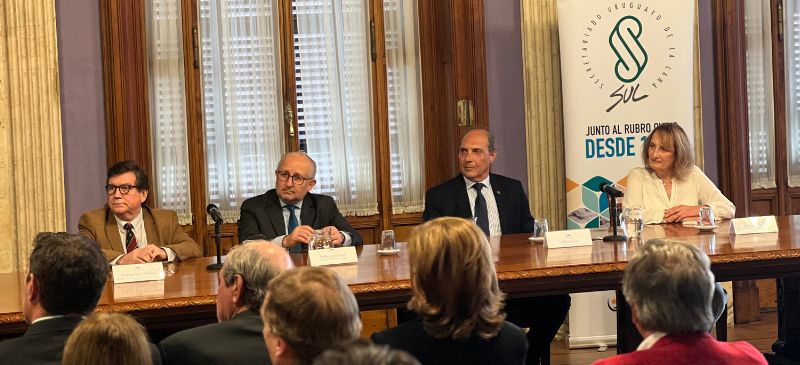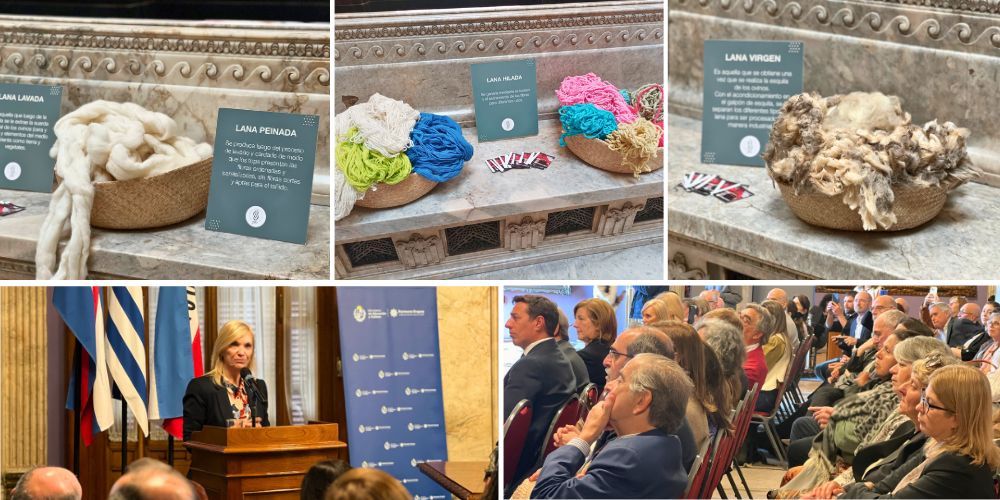- Home
- About us
- News
- Events
- EXPORT Export
-
BUY
Buy
BuyBuyFood and beverage Beef Caviar Dairy Products Fruits Healthy foods Olive oil Processed Foods Rice Sweets, honey and jams Wines ICT Software development Technology products
- INVEST Invest
- COUNTRY BRAND Country Brand
-
INFORMATION CENTER
Information center
InformationCenterInformationCenterReports Country reports Department reports Foreign trade reports Product-Destination worksheet Sectors reports Work documentsStatistical information Classification Uruguay XXI Exports Imports Innovative National Effort Macroeconomic Monitor Tools Buyers Exporters Investors
- Contact
-
Languages
Uruguay declares its wool cultural system as Intangible Cultural Heritage
The recognition highlights the importance of a set of ancestral knowledge and practices, fundamental to the country's identity and economy.
Share:

With a ceremony at the Legislative Palace, attended by the Vice President of the Republic, Beatriz Argimón and the Minister of Education and Culture (MEC), Pablo da Silveira, the wool cultural system was recognized as Intangible Cultural Heritage of Uruguay. This is the third non-tangible asset to receive this distinction, in recognition of the knowledge, traditions and practices related to the production and transformation of wool in the country.
Uruguay XXI, in its role of promotion for the sector, works actively positioning the Uruguay Wools brand worldwide, an action that has contributed significantly to position Uruguayan wool in demanding international markets, thus strengthening the global recognition of this national heritage.
The wool cultural system encompasses a vast body of knowledge and practices that include producers, shearers, artisans, industrial workers and artists who use wool as a raw material. During the event, authorities and experts underlined the relevance of this recognition, which comes after a process of research and consultation carried out by the National Cultural Heritage Commission between 2020 and 2023.

“This is an act of true justice,” said the Vice President of the Republic, Beatriz Argimón, who stressed that this declaration is not only linked to the country's history, but also to its future.
“In this knowledge that we inherited is also the care for the environment, the respect for animals”, she said and linked this legacy of the sector with the development of sustainable policies in the country.
The vice-president also highlighted the role that Uruguayan wool has gained in the most demanding markets and underlined the relevance of this declaration for public policies and the international positioning of a deeply Uruguayan product.
Along the same lines, the Minister of Education and Culture, Pablo da Silveira, emphasized the cultural impact of this declaration. “By declaring the wool system a heritage, we are recognizing a history, a set of knowledge and traditions that, although immaterial, have an enormous impact on the life of our society,” he said.
Leticia Canella, an anthropologist and member of the National Cultural Heritage Commission, said about the extensive work carried out to support this declaration, which involved consulting sheep producers, shearers and dyeing and weaving artisans, among other actors in the chain, what they learned about the cultural richness that surrounds the wool sector. “We realized that it was such a rich and complex universe, and that all the elements are intertwined. We knew that at the production level there were many challenges, but also great strengths, such as the valuation of wool as a natural fiber,” he said.
The president of the Uruguayan Wool Secretariat, Alfredo Fros, highlighted the economic and sustainable relevance of wool in Uruguay. “The sheep industry contributes around US$ 180 million a year to the country. In addition, wool is an example of sustainable production, key to the country's economic future,” he said.
With this declaration, the country reaffirms its commitment to the preservation of practices that are not only fundamental to its development, but also represent a cultural legacy for future generations.
